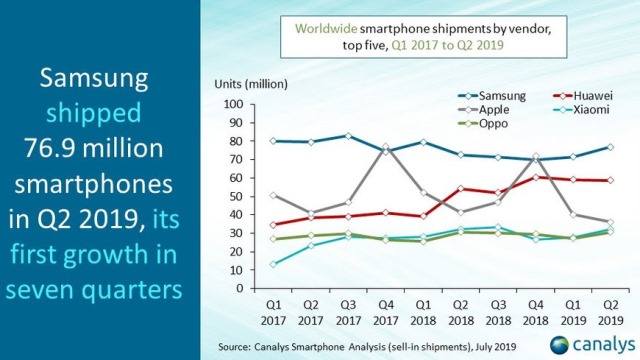Lee Jong-Min, vice president of IT & Mobile at Samsung Electronics has explained how the company’s performance in network business improved quarter-on-quarter during the second quarter of 2019.
 Samsung’s network business improved performance quarter-on-quarter, thanks to the commercialization of 5G in South Korea and continued expansion of LTE network in overseas markets.
Samsung’s network business improved performance quarter-on-quarter, thanks to the commercialization of 5G in South Korea and continued expansion of LTE network in overseas markets.
Samsung’s network business is estimated to have generated quarterly revenue of 1.59 trillion won in Q2 2019 as against 1.28 trillion won in Q1 2019 and 1.33 trillion won in Q2 2018.
Samsung competes with Ericsson, Nokia, Huawei Technologies and ZTE in the telecom network business. The current issues faced Huawei is yet to reflect in the customer wins for Samsung in the 5G network space.
The South Korean company said the network business will build a strong foundation for its expansion in the global 5G market based on its leadership in 5G commercialization in the United States and South Korea.
Samsung revenue in Q2 2019
Total sale 56.13 trillion won (–4 percent)
Mobile phone sale 24.27 trillion won (+7 percent)
Semiconductor 16.09 trillion won (–27 percent)
Memory 12.30 trillion won (–34 percent)
Display panel 7.62 trillion won (+35 percent)
Samsung will increase the supply of the 5G smartphone chipset solutions. It continued its efforts to expand the future SOC technological leadership by developing next-generation 1-chip 5G SOC that integrated model and processor.
Samsung plans to expand 5G chipset solutions and image sensors to address demand for the high specs in the smartphone market. Samsung will expand mid to long-term business scope by diversifying product offerings through the development of the 3D and FoD sensors and automotive IoT chips.
Korea, which started 5G commercial service last April, reached more than 1.8 million 5G service subscribers, and 5G service is growing faster than expected.
In addition to Korea and the US, Samsung will roll out S10 5G model to other countries such as Europe and Australia.
Samsung S10 5G smartphone remains popular in the 5G adopting countries, says Counter Point Research.
The consumer electronics company will also be expanding 5G line up with the Note 10 5G in the second half.
Strategy Analytics says the 5G smartphones would account for about 42 percent of the entire smartphone market by 2025.
Canalys said Samsung shipped 76.9 million units in Q2 2019, up 6 percent annually, and 7 percent sequentially. Samsung has made its biggest portfolio overhaul since it first launched Galaxy smartphones, discontinuing the J series and extending the A series into new price bands.
 “Samsung benefited in markets such as Europe in May and June as Huawei struggled to reassert its position,” said Canalys Research Director Rushabh Doshi.
“Samsung benefited in markets such as Europe in May and June as Huawei struggled to reassert its position,” said Canalys Research Director Rushabh Doshi.
Strategy Analytics said Samsung shipped 76.3 million smartphones in Q2 2019, growing 7 percent annually from 71.5 million units in Q2 2018.
“Samsung has lifted its global smartphone marketshare from 20 percent to 22 percent in the past year. Strong sales in midrange and entry segments increased Samsung’s shipments, but its profit margin declined due to fierce price competition,” Neil Mawston, executive director at Strategy Analytics, said.
Samsung said overall smartphone shipments increased thanks to strong sales in the mid-range-and-below segment, but flagship sales were slow amid waning launch effects of a new model and sluggish demand in the premium market.
South Korean chipmakers’ third-quarter results may be affected by Japanese curbs on the export of key materials, the latest salvo in a diplomatic row between Seoul and Tokyo over wartime forced labor, Reuters reported.
Baburajan K





